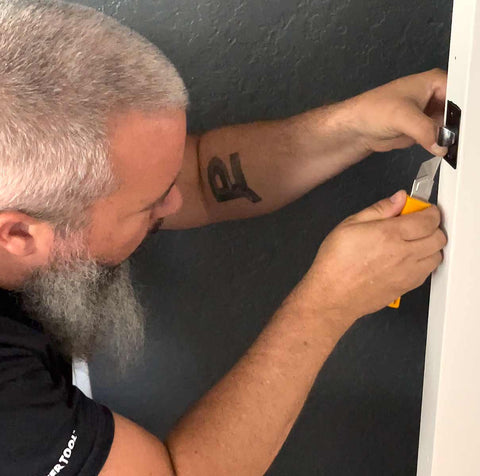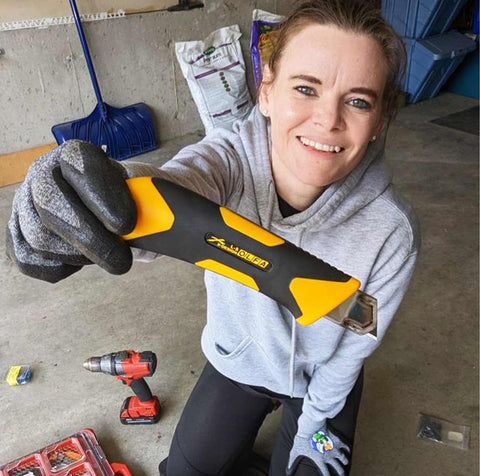
The Positive Impact of Apprenticeship Programs
Apprenticeship programs can be a very successful way to get your foot in the door to the labor market. They also increase access to quality jobs and higher education— especially for younger people. Apprenticeships typically combine on-the-job and classroom training over several years. Despite many benefits, there is still a lot to learn about them.
To analyze the positive benefits of apprenticeship programs, we collaborated with some of our OLFA Pro All-Stars. They shared their experiences as apprentices and talked about how these courses helped them to grow to where they are today.
Special All-Stars Guests:
Jessica Bannister (@hvacjess) is currently halfway through her apprenticeship. Specializing in HVAC/R, she first learned the history and theory behind the systems during her apprenticeship: “In my trade, I use a lot of apps for calculations and conversions, but at school you learn the theory behind those calculations. You learn the formulae and reasoning behind what you do in the field. Knowing this gives you a much greater understanding of your job, making you a better technician”.
Jacob Garrett (@thejakeofall) was also an apprentice when he was younger: “I started when I was 15 years old in high school. I worked at real companies that allowed me to get hands on experience on the job. I also started taking summer jobs, and one of them landed me a full-time position after graduation”.
Lucas D'Angelo (@mannmadeinma) has been working in and around the trades for about 11 years. Though he never had a formal apprenticeship program, he spent his first year and a half working with a skilled carpenter from Laos who taught him “Kung Fu Carpentry”. Jimmy was a master of his craft and was all about teaching. He was full of little tricks and tips that taught him “everything that he knows today”.

(Photo Credit: Jacob Garrett)
What Are Some Of The Main Values Provided By Apprenticeship Programs?
Apprenticeship programs come with many benefits. First of all, they provide better training for workers, allowing them to deepen and strengthen their understanding of the systems and components they work with (i.e. knowing how to replace a valve vs. knowing what that valve is made up of and how it works). “I think that having the knowledge behind your daily work gives you a deeper appreciation for your trade and yourself. It also ensures that safety standards and local codes are upheld” said Jess when answering the question.
Jacob agreed and also added that apprenticeship programs can also give you the freedom of making sure it’s the right path for you. “Typically, you apprentice before exiting high school, so that gives you the ability to figure out what’s right for you and what’s not. If you don’t like the field, you can change your mind without the financial burden of college.”
And when it comes to their value, Lucas had a lot to say: “The biggest value of an apprenticeship program is the opportunity to work in the field and learn from skilled craftspeople. The knowledge gained from that versus solely classroom learning is far and away a better training program– plus one that would ideally increase productivity, because the apprentices are taught to meet goals and expectations from day one. These are skills that just aren’t able to be learned in a classroom environment, it’s a unique opportunity”.

Have You Seen A Change In How Apprenticeship Programs Are Developed?
When responding to this question, the answers from the All-Stars were slightly different based on their trade and their location. When recounting her experience with apprenticeship programs, Jess said to be very happy: “The programs I am involved with in British Columbia allow the trainees to work in the field (getting paid AND being exposed to various scenarios), while attending school full-time. The equipment and tools we also use at school and in the labs are modern and keep up with technology”.
Jacob agreed, but also added that he thinks there is still more that can be done with these programs. “Sometimes they are more geared towards the technology behind the systems rather than the trade themselves (programming vs. plumbing) and I think both are equally important and should work together to help shape someone with a well-rounded knowledge of the trade”.
Do You Think There Is Still A “Stigma” Around Them?
Unfortunately, the unanimous response was that there is still stigma perceived around being an apprentice and working in the trades in general. Some parents still view a career in the trades as “dirty, dangerous and somewhat lower class”, explained Jess.
When answering this question, Lucas talked about his personal experience: “Sadly, there is still some stigma around apprenticeships and the trades. However, I’ve noticed that in the last few years this is starting to dwindle. While I never experienced any pushback or concern from my own family surrounding me being in the trades, I still witnessed it first hand from some of my friends’ parents. Of course, this was back when I was fresh out of school, but I received a lot of comments from friends’ such as, “Oh, still doing this job huh?”. I never allowed these comments to upset me, because what I did (and still do) has brought me happiness and it has afforded me the life I want to live”.

(Photo Credit: Lucas D'Angelo)
How Do We Help Bring Awareness To These Programs?
Despite the stigma surrounding the trades, there are many ways to bring awareness to these programs. Social media is one great way. Social media provides a platform for many successful tradespeople, like the OLFA Pro All-Stars, to share their success stories. They can talk about their lives, their work, and how these meaningful careers can build societies. By showing the public that these careers are not only fulfilling and lucrative but also desirable, we can hopefully bring more awareness to apprenticeship programs.
Jess also added that awareness starts right at school: “We need guidance counsellors to speak about apprenticeships just as much as they do for colleges/universities. We need to see more tradespeople out in public and brands supporting these people as much as possible”.
Lucas concluded our interview with a positive outlook on this: “The solution is truly to educate people about what it actually means to be in the trades and the fact that that it can be fulfilling and allow one to make an excellent living doing what they enjoy.”

(Photo Credit): Jessica Bannister
For more information on National Apprenticeship Week, visit Apprenticeship Week USA and discover resources on how to become an apprentice, apprenticeship programs, events and more.
And if you are not already, check out our social media channels and share your own stories so we can keep spreading the word about your careers in the trades!



